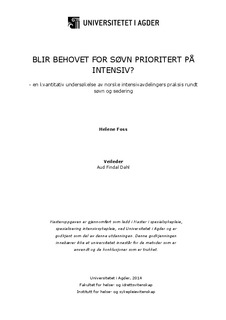Blir behovet for søvn prioritert på intensiv? : - en kvantitativ undersøkelse av norske intensivavdelingers praksis rundt søvn og sedering
Master thesis
Permanent lenke
http://hdl.handle.net/11250/223340Utgivelsesdato
2014Metadata
Vis full innførselSamlinger
Sammendrag
Background: Patients in the intensive care units suffer from sleep disturbances. The lack of sleep may cause physical and psychological disturbances, increased morbidity and prolonged stay. The nurses evaluate patients’ sleep mainly on their own perception. No registration of sleeping and sedation practices has been conducted in intensive care units in Norway. Aim: To get insight into Norwegian intensive care nurses sleeping and sedation practices and what kind of interventions are common to conduct promoting better sleep and to explore if sedation- or sleep assessment tools, or sedation- or sleep protocols were used. Method: A survey of the Norwegian intensive care units was conducted. All the nursemanagers in the adult intensive care units in Norway were recruited. Data were analysed using descriptive statistics, and teaching and non-teaching hospitals were compared. Results: Nurses are aware of sleep disturbances, and use several strategies to promote sleep. The most commonly used interventions were to turn off lights in the patient’s room/corridor, to shield the patient with curtains, reduce noise from staff, use of clock and reduce nursing interventions during the nights. Nurses perceive only a moderate feeling of autonomy, but feel that they have a great influence on sleeping practises. Conclusions: Nurses have influence on sleep practice, and actively promotes sleep in the intensive care unit, but feel only a moderate autonomy. There is no use of sleep-assessment tools, but sedation assessment tools are commonly used.
Beskrivelse
Masteroppgave i spesialsykepleie – Universitetet i Agder 2014
